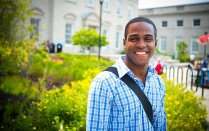Campus News
UB Engineering holds town hall on racial injustice

Members of the panel at the School of Engineering and Applied Sciences' Zoom town hall on racial injustice. Photo: Cory Nealon
By CORY NEALON
Published July 2, 2020
The School of Engineering and Applied Sciences (SEAS) held a virtual town hall Friday to discuss racial injustice, and how it affects the school, the greater Buffalo area and beyond.
Hosted by Dean Kemper Lewis, the event featured a panel of faculty, staff and students.
The school, which has been recognized as a leader in higher education for diversity and inclusion, has nonetheless struggled to add faculty, staff and students of color, particularly from the Black community.
Panel members began the event by stating that racial inequities exist at UB and within the school. They discussed macroaggressions (large-scale or overt racism) and microaggressions, which are common verbal and behavioral communications that, intentional or not, transmit hostile or negative messages. They also explored the subject of white privilege.
“Just because you have privilege doesn’t mean you’ve never endured struggle, you’ve never faced hardship, you’ve never faced adversity or any issues,” said Nelaje Branch, a senior computer science major and former president of the UB chapter of the National Society of Black Engineers.
It means that there are situations that you have either never encountered or would interpret differently than someone else, she said.
Obe Joseph, first-year PhD candidate in industrial engineering who completed her undergraduate studies at UB, said individuals’ perceptions of these issues often depend on whether they are exposed to cultures outside of their own.
“Whether or not you believe (racial inequity) exists has a lot to do with the circle of people you associate with,” Joseph said.
Kevin Burke, assistant professor of teaching in the Department of Electrical Engineering, said UB has programs in place to support students of color. Examples include, but are not limited to, the Arthur O. Eve Educational Opportunity Program, the Collegiate Science and Technology Entry Program and Louis Stokes Alliance for Minority Participation program.
“We don’t have to start from ground zero,” Burke said. “There are programs and they have limited resources, and with limited resources you can only service a select few. It’s time for the university to step up and supplement this funding.”
Yousouf Amolegbe, president of the Student Association and a master’s student in industrial and systems engineering, said such programs are critical for the development of students of color.
“A lot of Black students that come into SEAS want to be engineers, have aspired to be engineers,” he said, but they struggle their freshman year because they did not take college preparatory classes like many of their classmates.
Amolegbe served as a moderator along with Kristen Moore, associate professor in the Department of Engineering Education, and Sonia Grant, assistant for STEM diversity programs in SEAS.
Christina Escobar, executive assistant to the dean, said the school would benefit from a more diverse staff. For example, she said there are very few Black staff members, and that this can make students of color, especially freshmen, feel uncomfortable.
“They don’t see anybody of color, and that’s very discouraging,” she said.
Shannon Phillips, senior administrative associate in the school’s Office of Undergraduate Engineering, said such problems stem from historic hiring practices that have resulted in generational racial inequities.
“Systemic racism derives from power structures that replicate themselves,” she said.
Krishna Rajan, SUNY Distinguished Professor and Erich Bloch Chair of the Department of Materials Design and Innovation (MDI), addressed issues of hiring and the misconception that building a diverse staff could lead to less qualified employees.
Rajan said there is a common misperception “that promoting diversity means you compromise quality” and that is one “of the biggest fallacies that has permeated” academia, said Rajan, who has been building MDI since its inception in 2015.
Lewis stressed that everyone within the school consider the people they work closely with, stressing that small day-to-day discussions can help break down systemic racism.
“It’s so vitally important that each of us think about our own spheres of influence,” he said.
He added: “It helps us start the process of identifying and correcting the long-term systemic racial disparities and aggressions that are present here in our SEAS community.”
He closed by saying the school will form working groups to address issues raised during the town hall, including:
- Increasing diversity throughout the school.
- Creating more opportunities for the entire SEAS community to contribute to change.
- Enhancing and developing support systems for people of color.
- Removing systemic barriers to success.
- Developing guidelines to identify and end micro- and macroaggressions.
Members of the UB community can watch the town hall, which runs about an hour, by logging into their UB account at this website: http://engineering.buffalo.edu/home/news/events/town-hall.html.
